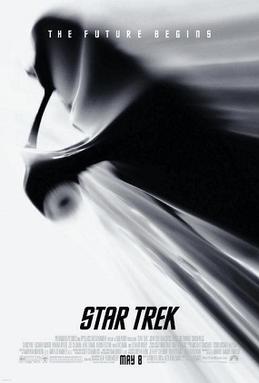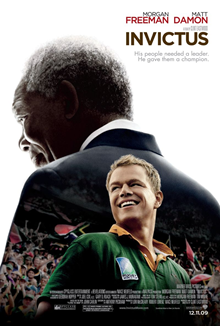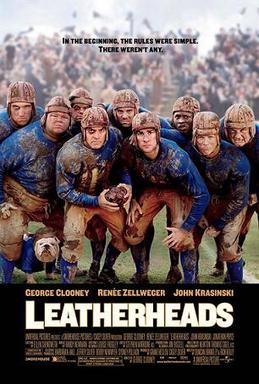Star Trek XI: The Reboot
 - The Star Trek franchise started the 21st Century off with its head hung low after the disappointing end to The Next Generation crew in 2002's Star Trek: Nemesis and the end of the awful "Star Trek: Enterprise" TV show in 2005. The series needed to boldly go backwards and begin again - and J.J. Abrams' Star Trek did just that and more. Star Trek (2009) is an excellent Trek film and all-out sci-fi thriller that gives the Trek franchise new life, both a reboot of the Star Trek franchise with its fresh take on the original characters and Trek world and a sequel with its tie-in to current Trek canon.
- The Star Trek franchise started the 21st Century off with its head hung low after the disappointing end to The Next Generation crew in 2002's Star Trek: Nemesis and the end of the awful "Star Trek: Enterprise" TV show in 2005. The series needed to boldly go backwards and begin again - and J.J. Abrams' Star Trek did just that and more. Star Trek (2009) is an excellent Trek film and all-out sci-fi thriller that gives the Trek franchise new life, both a reboot of the Star Trek franchise with its fresh take on the original characters and Trek world and a sequel with its tie-in to current Trek canon.So, what is the best way to start over for the betterment of the franchise but, at the same time, not completely start over as to not anger the Klingon-fluent and fake ear-wearing Trekkies? J.J. Abrams and company figured out the perfect answer: explore the roots and beginnings of the Enterprise crew with time-travel, an alternate reality, and Leonard Nimoy's on-screen blessings. Completely giving away the plot is all-too easy ,so I will not attempt to explain it; but one does not really need to know the plot anyway as the film's main focus is setting up and bringing together the many great characters and the new actors who bring them to life.
Die-hard Trekkies may disagree but I think that the cast for 2009's Star Trek generally improve upon the original actors and characters. Chris Pine is the new James T. Kirk and is far better than William Shatner in the role. Shatner is not much of an actor, not bad but ultimately gets by on individual charisma rather than acting chops. Pine however, shows that he is a much better actor - he is very funny without being cheesy like Shatner and there seems to be a lot more going on upstairs in his Kirk. Although he is unable to eclipse Nimoy's Spock performances, Zachary Quinto is the new Spock and does a great job. This Trek film explores Spock's human half more than any other Trek film or TV episode and you can really feel Spock's struggle to find the balance between the two half thanks to Quinto's performance.
The highlight of the cast is Karl Urban as Dr. McCoy. The constantly angry yet caring at the same time nature of the character makes McCoy the most naturally complex and genuine character of the original series crew - plus, his sarcasm and willingness to say anything he wants makes for some prime entertainment - and Urban is absolutely fantastic in the role. Deforest Kelley's take is superior but, wrongfully accused of doing a mock Kelley impression, Urban manages to nail the multi-faceted nature of the character with a different and terrific flare that makes the character his own. Urban's McCoy is a strong and independent character but time will tell if Urban is relegated to Kelley's role (all too often was used as a plot device used to develop Kirk or add tension to a scene by yelling at someone).
Simon Pegg was one of the best casting decisions of the film and ends up one of the film's highlights, greatly improving the character of Montgomery Scott. Pegg is a hilarious comedian but he is also a very strong actor and he shows both qualities here in Star Trek '09. Zoe Saldana is a fine Uhura (although is unfortunately often relegated to a device to further develop Spock and Kirk rather than be her own character) - but cannot be compared to Nichelle Nichols' original take on the character. The grace, presence, and amount of energy that Nichols emits for someone who is usually sitting down all the time cannot be duplicated or surpassed - but Saldana does an admirable job.
The rest of the Trek supporters turn out better than the originals: John Cho's strength and comedic timing puts him in front of George Takei and Chekov is a great character for once in the 40 years of Star Trek thanks to the energetic portrayal of Anton Yelchin. Add a great villain in Eric Bana's revenge-obsessed Nero, Bruce Greenwood's quiet take on the heroic Christopher Pike, a moving feature film debut from then-unknown Chris Hemsworth as George Kirk, a stern showing from Ben Cross as Spock's father Sarek, an unrecognizable Winona Ryder as Spock's mother, and Leonard Nimoy's cameo and you have an excellently cast Trek film.
But Star Trek excels beyond just having a terrific cast. Michael Giacchino's score grabs you before the film has even started - the very thematic and completely original score (but also featuring a terrific arrangement of Alexander Courage's original TV theme) is easily Giacchino's best. Also, naturally, the special effects are amazing - the pictures speak louder than any words I could write.
Because the '09 Trek film-making team of Abrams, Orci, Kurtzman, and company is made up of both Trekkers and non-Trekkers, Star Trek '09 ends up having the power to entertain Trek fans and non-Trek fans alike. The writing is great - the MacGuffin devices take some sci-fi faith, some scenes are just a bit too on-the-nose, and some things remind one of Abrams' other projects, but the story is intriguing overall, the characters are written incredibly well, the film balances humor and drama perfectly, and the dialogue could not be better. Abrams and company also do a brilliant job in the way of atmosphere, creating a Star Trek world that does not spare the beauty and majesty of space while showing its dark side and giving the audience a sense of that space can be "disease and danger wrapped in darkness and silence." The future of Star Trek certainly looks bright as long as it remains in the hands of J.J. Abrams.
But Star Trek excels beyond just having a terrific cast. Michael Giacchino's score grabs you before the film has even started - the very thematic and completely original score (but also featuring a terrific arrangement of Alexander Courage's original TV theme) is easily Giacchino's best. Also, naturally, the special effects are amazing - the pictures speak louder than any words I could write.
Because the '09 Trek film-making team of Abrams, Orci, Kurtzman, and company is made up of both Trekkers and non-Trekkers, Star Trek '09 ends up having the power to entertain Trek fans and non-Trek fans alike. The writing is great - the MacGuffin devices take some sci-fi faith, some scenes are just a bit too on-the-nose, and some things remind one of Abrams' other projects, but the story is intriguing overall, the characters are written incredibly well, the film balances humor and drama perfectly, and the dialogue could not be better. Abrams and company also do a brilliant job in the way of atmosphere, creating a Star Trek world that does not spare the beauty and majesty of space while showing its dark side and giving the audience a sense of that space can be "disease and danger wrapped in darkness and silence." The future of Star Trek certainly looks bright as long as it remains in the hands of J.J. Abrams.
CBC Rating: 9/10

